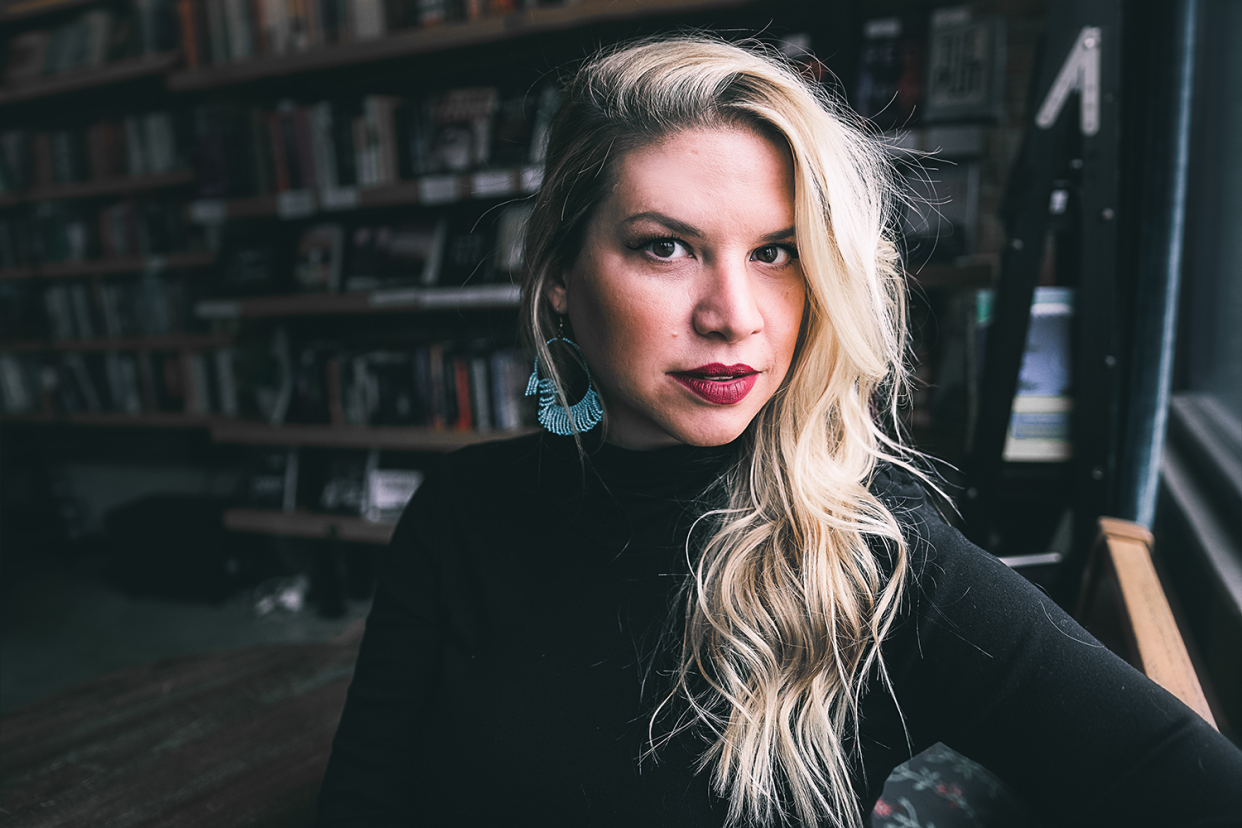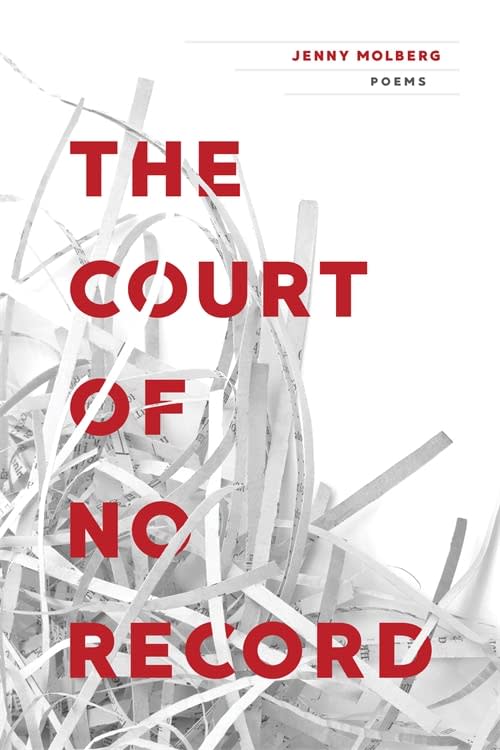How Unbound poet Jenny Molberg reclaims the power of story for domestic violence survivors

Fine print matters — to our experience of the law, to the way we move within poems. The smallest bend of phrase or slightly looping letter holds power enough to create considerable differences.
A court of no record convenes, then might as well fade away after its conclusion, with no documentation for parties to carry home.
"The Court of No Record" is a new book from Kansas City poet Jenny Molberg, a lyrical project of narrative reclamation that documents the harm of domestic violence — both to the body, and to the spirit silenced by its culture and court system. Molberg's poems never choose between bleakness and beauty, absurdity and intensity, nor do these qualities merely intersect. Instead, they try on each other's clothes, work a shift at each other's jobs until the bleak is beautiful and vice-versa.
Approaching dangerous, difficult topics as only a writer could, Molberg found the poem's power to connect authors and readers, survivors and concerned bystanders, through a "shared language of trauma."
"Using metaphor to explore that is really interesting ... when someone else has gone through something similar, they recognize how that metaphor is working," she said.
Molberg will bring this language to Columbia and the Unbound Book Festival next week, both reading for and working alongside attendees.
More: Unbound can't-miss events, from Amazon to horror stories, sports writing to Kansas City lit
Writing multi-dimensional poetry about domestic violence
"May The Stars Guide You Safely Home," the collection's first poem, opens on an appropriately staggering line.
"After I call the cops to ask for a protective order / I read about the girlfriend of a serial killer."
Molberg chases that line in the direction the book will go and the conversations it will broach — about intimate partner violence, America's tilted obsession with true crime, the scales we use to weigh who can speak out and who should stay silent. She observes the way women are treated for even raising their eyebrows, let alone their voices.
"How it seems we’re always punished for asking questions. America is watching a show / about a man who is fascinating," she writes.
Almost immediately beginning the work of reframing our stories, the poet moves perpetrators out of focus to foreground victims. "I don't care about him. I want to say their names," Molberg writes, then proceeds to name eight women.
From this beginning, unsettling yet somehow exhilarating — the reader senses the locus of power might just be shifting — Molberg explores the untold dimensions of domestic violence.

The early poem "Shooting at Oakbrook Apartments" captures the rare occurrence when tragic logic doesn't play out, then offers a proverb: "Luck is the brain’s way of fooling yourself."
"Bridge" conjures the memory of a woman murdered decades ago, then asks hard questions of the reader, even one well-versed in trauma. "I study Ann’s black hair, a curled wreath, in the book / about her killer. Her large glasses exalt the kind / of eyes that speak. What right do I have / to think about Ann?"
In "Hunting," Molberg brings home the truth that a weapon is an extension of the body which wields it.
"Gun is the language that means / America," she writes. "The bullet is an extension of the gun’s idea, / which was a man’s, a man who thought all the way through."
More: Two finalists for One Read: Choose historical novel or scientific adventure
Molberg's documentary perspective grows more personal in poems such as "Occam's Razor," as she writes of "trauma bonded" friends and begins a series of observations which stretch throughout the entire book, about beauty and its limits.
"If you hear hooves, remember: there are no unicorns, / only the meat-packing plant," she writes. "The train you hear / is no tornado. Not northern lights, / but the sky’s explainable chemistry."
The language of silence and safety
"The Court of No Record" deftly, emotionally blends the personal and procedural. Calling up her own experience, and experiences close to her, Molberg sifted what to stamp upon the page and what to leave in the furthermost margins. The "blurry" nature of genre, and the way poetry lives between and beyond truths, supplied a strange sort of blessing.
"The truth is protected in a different kind of way," Molberg said. "I’m really interested in how metaphor and persona and all these elements of poetic craft physically protect somebody."
Metaphor creates distance in at least two ways, she said. The device suitably captures the distancing trauma provokes, but also distances the poet or their speaker enough to feel safe writing about reality.
In "Runaway," Molberg comes closest to defining the poet's role, comparing the lyrical vision to that of the runaway's: "I make imaginary places where real things happen."
"My Scorpion" is a perfect precursor to the book's middle section, in which Molberg plunges head-first into the courtroom and its oft-confounding language. In this earlier piece, she captures a moment of sensory deprivation:
"From the plaintiff table the lawyer asks yes or no, / yes or no. But none of the questions / are yes or no questions."
As the book reaches middle passage, Molberg does the work of a journalist and a poet, "mining" language — sometimes verbatim — from real court transcripts. These poems underline the absurdity of legal proceedings, but also truly place the reader within a courtroom's confines, recreating the sense of losing control over your own story, your own life.
"I wanted the poems to get as close to the disorienting, confusing and ridiculous nature of the whole thing — and the frustration of the silencing," Molberg said. "Poems got the closest to that, because there’s all that negative space. All that quiet."
More: Meet the strong, varied musical lineup playing Columbia's two-day Earth Day celebration
The inadequacy of the system, and the helplessness a victim feels seated just feet from their abuser, comes through. So does the logic and language of abusers, which would be risible if it weren't so maddening.
Abusers say ridiculous things, Molberg affirmed, using convoluted speech and creating serious leaps in logic. And yet they speak with such authority, that even absurdity becomes power.
"Twitter is very mean. People are very mean / when they repeat the things you did to them," a man says under oath in "Testimony of the Alpha."
Molberg hopes her poems turn the absurdity back on abusers, and thus strip them of some power.
Creating 'anti-pastoral' poems
Throughout, Molberg engages in what she calls "anti-pastoral" writing: taking a piece of that poetic style back from men; noticing beauty even in moments when it feels as though access to beauty is limited; and recognizing both the urgency of beauty and the circumstances we live within, she said.
The sky over "Recess in Broken Mirror County" is "strangulation blue" and "newly planted lacebark elms whisper the court’s atrocities"; "stars like splatters of luminol" exist "against the sky’s black floor" in "Against the Cult of True Womanhood." Even in those moments of limitation — perhaps especially in them — Molberg's speaker sees the world in surprising, necessary ways.
"The November air says I belong to the earth and not the court," she writes in a moment of affirmation within "Recess in Broken Mirror County."
The speaker of "Bitch Under a Tree Eating Wendy’s" struggles with the intrusions upon her body and the temptation to "shut down," yet still finds odd allure in "the perfect / golden yellow of this fry wearing its backdrop of grass."
"The Court of No Record" shows that, for the poet, the only way through was really going through.
"The only solution for me as a writer was to write about it, to have some power over my own narrative," Molberg said.
Adopting a more humorous, "bad bitch" voice in certain poems, the gesture toward power eventually became the real thing, she testified.
"Writing through that persona allowed me to laugh at it — laughing at it was really hard for a long time — and to feel like I did have some control on the other side of it," Molberg said.
The poet has humble aims: to exercise "one small voice in a dialogue that’s important." And she hopes that voice might perhaps inspire recognition or courage in others. This desire hearkens back to the beginning of the book; Molberg employs an epigraph from the late, great bell hooks who notes that "There can be no love without justice."
"The Court of No Record" is an act of love, for survivors, readers and for Molberg herself. If a book like this keeps the silence at bay long enough for testimony and solidarity to fill its space, then perhaps justice will ripple forth too.
Molberg will read alongside Janine Joseph and Jose Faus at 3:15 p.m. Saturday at Top Ten Wines. She will also lead a community workshop Sunday on "Personifying the Unsayable." Visit https://www.unboundbookfestival.com/ for more details.
Aarik Danielsen is the features and culture editor for the Tribune. Contact him at adanielsen@columbiatribune.com or by calling 573-815-1731. Find him on Twitter @aarikdanielsen.
This article originally appeared on Columbia Daily Tribune: Unbound festival poet Jenny Molberg goes on the 'Record' for survivors' sake

